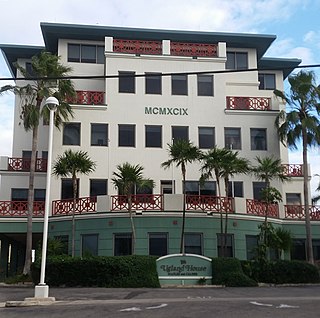
The Delaware General Corporation Law is the statute of the Delaware Code that governs corporate law in the U.S. state of Delaware. Adopted in 1899, the statute has since seen Delaware become the most important jurisdiction in United States corporate law. Delaware is considered a corporate haven because of its business-friendly corporate laws compared to most other U.S. states. Over half of publicly traded corporations listed in the New York Stock Exchange and 66% of the Fortune 500, including Walmart, the world's largest company by revenue, are incorporated in the state.

A limited liability company is the US-specific form of a private limited company. It is a business structure that can combine the pass-through taxation of a partnership or sole proprietorship with the limited liability of a corporation. An LLC is not a corporation under state law; it is a legal form of a company that provides limited liability to its owners in many jurisdictions. LLCs are well known for the flexibility that they provide to business owners; depending on the situation, an LLC may elect to use corporate tax rules instead of being treated as a partnership, and, under certain circumstances, LLCs may be organized as not-for-profit. In certain U.S. states, businesses that provide professional services requiring a state professional license, such as legal or medical services, may not be allowed to form an LLC but may be required to form a similar entity called a professional limited liability company (PLLC).

A limited liability partnership (LLP) is a partnership in which some or all partners have limited liabilities. It therefore can exhibit elements of partnerships and corporations. In an LLP, each partner is not responsible or liable for another partner's misconduct or negligence. This distinguishes an LLP from a traditional partnership under the UK Partnership Act 1890, in which each partner has joint liability. In an LLP, some or all partners have a form of limited liability similar to that of the shareholders of a corporation. Unlike corporate shareholders, the partners have the power to manage the business directly. In contrast, corporate shareholders must elect a board of directors under the laws of various state charters. The board organizes itself and hires corporate officers who then have as "corporate" individuals the legal responsibility to manage the corporation in the corporation's best interest. An LLP also contains a different level of tax liability from that of a corporation.

A private limited company is any type of business entity in "private" ownership used in many jurisdictions, in contrast to a publicly listed company, with some differences from country to country. Examples include the LLC in the United States, private company limited by shares in the United Kingdom, GmbH in Germany and Austria, société à responsabilité limitée in France, and sociedad de responsabilidad limitada in the Spanish-speaking world. The benefit of having a private limited company is that there is limited liability. However, shares can only be sold to shareholders in the business, which means that it can be difficult to liquidate such a company.

A shell corporation is a company or corporation that exists only on paper and has no office and no employees, but may have a bank account or may hold passive investments or be the registered owner of assets, such as intellectual property, or ships. Shell companies may be registered to the address of a company that provides a service setting up shell companies, and which may act as the agent for receipt of legal correspondence. The company may serve as a vehicle for business transactions without itself having any significant assets or operations.

Corporate law is the body of law governing the rights, relations, and conduct of persons, companies, organizations and businesses. The term refers to the legal practice of law relating to corporations, or to the theory of corporations. Corporate law often describes the law relating to matters which derive directly from the life-cycle of a corporation. It thus encompasses the formation, funding, governance, and death of a corporation.

Ireland's Corporate Tax System is a central component of Ireland's economy. In 2016–17, foreign firms paid 80% of Irish corporate tax, employed 25% of the Irish labour force, and created 57% of Irish OECD non-farm value-add. As of 2017, 25 of the top 50 Irish firms were U.S.–controlled businesses, representing 70% of the revenue of the top 50 Irish firms. By 2018, Ireland had received the most U.S. § Corporate tax inversions in history, and Apple was over one–fifth of Irish GDP. Academics rank Ireland as the largest tax haven; larger than the Caribbean tax haven system.
A flow-through entity (FTE) is a legal entity where income "flows through" to investors or owners; that is, the income of the entity is treated as the income of the investors or owners. Flow-through entities are also known as pass-through entities or fiscally-transparent entities.
Tax consolidation, or combined reporting, is a regime adopted in the tax or revenue legislation of a number of countries which treats a group of wholly owned or majority-owned companies and other entities as a single entity for tax purposes. This generally means that the head entity of the group is responsible for all or most of the group's tax obligations. Consolidation is usually an all-or-nothing event: once the decision to consolidate has been made, companies are irrevocably bound. Only by having less than a 100% interest in a subsidiary can that subsidiary be left out of the consolidation.

A Nevada corporation is a corporation incorporated under Chapter 78 of the Nevada Revised Statutes of the U.S. state of Nevada. It is significant in United States corporate law. Nevada, like Delaware, is well known as a state that offers a corporate haven. Many major corporations are incorporated in Nevada, particularly corporations whose headquarters are located in California and other Western states.

In United States business law, a registered agent is a business or individual designated to receive service of process (SOP) when a business entity is a party in a legal action such as a lawsuit or summons. The registered agent's address may also be where the state sends the paperwork for the periodic renewal of the business entity's charter. The registered agent for a business entity may be an officer or employee of the company, or a third party, such as the organization's lawyer or a service company. Failure to properly maintain a registered agent can affect a company negatively.
Foreign corporation is a term used in the United States to describe an existing corporation that conducts business in a state or jurisdiction other than where it was originally incorporated. The term applies both to domestic corporations that are incorporated in another state and to corporations that are incorporated in a nation other than the United States. All states require that foreign corporations register with the state before conducting business in the state.

CT, or the Corporation Trust Company, is a wholly owned subsidiary of Wolters Kluwer, a multi-national information services company based in the Netherlands with operations in more than 35 countries. CT Corporation is the largest registered agent service firm in the world representing hundreds of thousands of business entities worldwide. It provides software and services that legal professionals use. As a provider of registered agent services the company is not responsible for the business or legal affairs of the customers it serves.

Ugland House is a building located in George Town, Cayman Islands. Located at 121 South Church Street, the building is occupied by the law firm Maples and Calder and is the registered office address for 40,000 entities, including many major investment funds, international joint ventures and capital market issuers.

A Delaware statutory trust (DST) is a legally recognized trust that is set up for the purpose of business, but not necessarily in the U.S. state of Delaware. It may also be referred to as an Unincorporated Business Trust or UBO.

Proposition 39 is a ballot initiative in the state of California that modifies the way out-of-state corporations calculate their income tax burdens. The proposition was approved by voters in the November 6 general election, with 61.1% voting in favor of it.

In the United States, a benefit corporation or B corporation is a type of for-profit corporate entity, authorized by 35 U.S. states and the District of Columbia, that includes positive impact on society, workers, the community and the environment in addition to profit as its legally defined goals, in that the definition of "best interest of the corporation" is specified to include those impacts. Laws concerning conventional corporations typically do not specify the definition of "best interest of the corporation", which has led to the interpretation that increasing shareholder value is the only overarching or compelling interest of a corporation. Benefit corporations may not differ much from traditional C corporations. A C corporation may change to a B corporation merely by stating in its approved corporate bylaws that it is a benefit corporation; however in certain jurisdictions, the terms "public benefit corporation" or "PBC" are also required to be in the legal name of B corporations.
In 2010, the United States implemented the Foreign Account Tax Compliance Act; the law required financial firms around the world to report accounts held by US citizens to the Internal Revenue Service. The US on the other hand refused the Common Reporting Standard set up by the Organisation for Economic Co-operation and Development, alongside Vanuatu and Bahrain.

Matheson, is an Irish law firm partnership based in the IFSC in Dublin, which specialises in multinational tax schemes, and tax structuring of special purpose vehicles. Matheson is estimated to be Ireland's largest corporate law firm. Matheson state in the International Tax Review that their tax department is: "significantly the largest tax practice group amongst Irish law firms".








